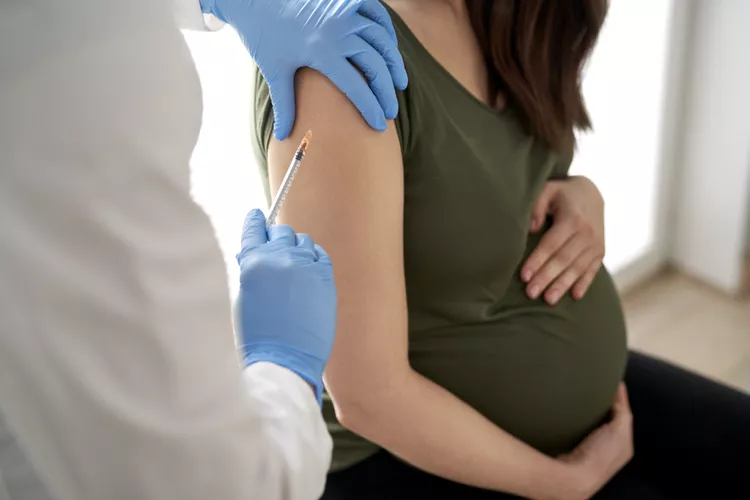Pfizer’s groundbreaking RSV vaccine tailored for infants, known as Abrysvo, has successfully secured approval from the Food and Drug Administration (FDA).
Responsible for triggering up to 80,000 pediatric hospitalizations and 300 pediatric fatalities annually in the United States, the respiratory syncytial virus (RSV) is a significant health concern. While most infants who contract RSV experience mild respiratory symptoms such as congestion, cough, and fatigue, there’s a subset that encounters breathing difficulties and potential complications like pneumonia.
Given that there is currently no cure for RSV, the approval of a safe and effective vaccine aimed at preventing severe symptoms marks a significant milestone.
Distinguished as the first of its kind, Pfizer’s RSV vaccine for newborns has emerged as a game-changer in healthcare.
The phase 3 clinical trial outcomes, evaluating the vaccine’s effectiveness, revealed that when administered during pregnancy, it exhibits an 82% efficacy rate in preventing severe illnesses in newborns during their first 90 days of life. This efficacy rate remains at 69% for up to six months post-birth.
“A reliable and efficacious vaccine against RSV for infants has been irritatingly elusive for many years, and it represents a significant unmet clinical need. This degree of protection could be a game-changer for newborns,” stated Ross Kedl, PhD, a professor of immunology and microbiology at the University of Colorado Anschutz Medical Campus.
Mechanism of the New Infant RSV Vaccine Pfizer’s innovative approach to protecting newborns from RSV entails administering the vaccine to expectant mothers during pregnancy.
Upon vaccination, the mother’s immune system generates antibodies capable of swiftly identifying and neutralizing the virus and infected cells. These maternal antibodies cross the placental barrier, providing safeguarding for the newborn. This protection is particularly vital due to the developing immune systems of newborns, rendering them more susceptible to infections in their initial weeks of life.
The protective effect can be prolonged post-delivery through breastfeeding, as breast milk contains additional protective antibodies that transfer to the infant.
However, it’s important to note that antibody effectiveness diminishes after approximately six months. Given that most infants encounter RSV by the age of two, the vaccine ensures protection during the critical period when infants are most vulnerable.
Notably, the vaccine is well-tolerated and the clinical trials did not report any significant safety issues, as emphasized by Alok Patel, MD, a pediatric physician at Stanford Medicine Children’s Health.
The vaccine formulation avoids any added adjuvants—substances that amplify the body’s immune response—resulting in fewer immediate post-vaccination side effects, such as fever or discomfort, making it a more favorable choice for expecting mothers, Kedl highlighted.
Impact of an RSV Vaccine for Infants While most children with RSV develop mild symptoms and recover within a week, certain infants, particularly those born prematurely or with underlying health conditions, can experience severe symptoms, explained Jill Purdie, MD, a board-certified OB/GYN and medical director at Pediatrix Medical Group.
In the United States, around 2.1 million children annually receive medical attention for RSV. The virus is the primary cause of hospitalizations among children under one year old and is a leading contributor to pneumonia in this age group.
A maternal RSV vaccine with efficacy could significantly reduce hospitalizations and fatalities among infants under six months. According to Purdie, Pfizer’s vaccine would contribute substantially to alleviating this burden.
“On a global scale, RSV is responsible for roughly 140,000 deaths annually. Hence, a safe, effective, and readily available vaccine would be a monumental achievement for public health,” stated Patel.
The Path Forward for Vaccine Availability Eligibility criteria for the vaccine are not yet clearly defined. However, as Purdie indicated, it’s expected that all pregnant individuals will be eligible. She mentioned, “I assume the vaccine would be offered to all pregnant women since all babies would be at risk.”
Vaccine advisory boards like those of the Centers for Disease Control (CDC) and the American College of Obstetricians and Gynecologists (ACOG) are likely to provide recommendations in the near future.
In preparation for FDA approval, Pfizer has proactively scaled up supply to ensure sufficient doses are available when required, according to a Pfizer spokesperson.
“Pfizer, collaborating with regulatory and health authorities, is enthusiastic about working together to ensure the vaccine is accessible to offer protection ahead of the next RSV season’s peak,” stated the company’s spokesperson.
This vaccine marks the first available option for pregnant individuals seeking to safeguard their newborns from RSV-related complications.
“The RSV vaccine will be a monumental achievement in the realm of vaccine science,” Patel affirmed. “RSV affects millions of individuals globally each year, and scientists have strived for decades to develop an effective vaccine.”
Sources:
- Food and Drug Administration. Fda approves first vaccine for pregnant individuals to prevent rsv in infants.
- Centers for Disease Control and Prevention. RSV surveillance and research.
- Etti M, Calvert A, Galiza E, et al. Maternal vaccination: a review of current evidence and recommendations. Am J Obstet Gynecol. 2022;226(4):459-474. doi:10.1016/j.ajog.2021.10.041
